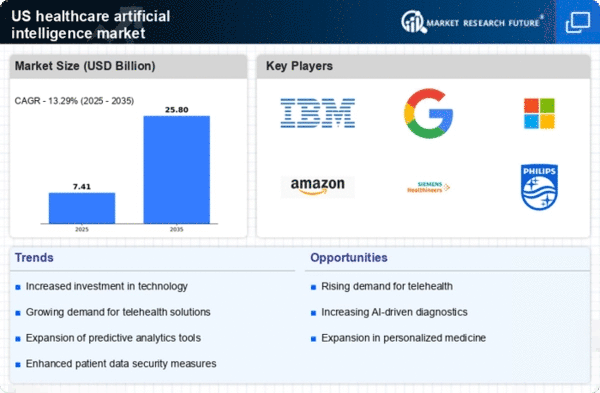Growing Focus on Patient-Centric Care
The growing focus on patient-centric care is reshaping the healthcare artificial-intelligence market. Healthcare providers are increasingly prioritizing personalized treatment approaches that cater to individual patient needs. AI technologies facilitate this shift by enabling tailored treatment plans based on comprehensive data analysis. As of 2025, it is projected that 70% of healthcare organizations will implement AI-driven solutions to enhance patient engagement and satisfaction. This trend reflects a broader movement towards holistic care, where AI plays a vital role in understanding patient preferences and improving health outcomes, thereby driving the expansion of the healthcare artificial-intelligence market.
Regulatory Support for AI Integration
Regulatory support for AI integration in healthcare is emerging as a crucial driver in the healthcare artificial-intelligence market. Government agencies are establishing frameworks that facilitate the safe and effective use of AI technologies in clinical settings. This regulatory environment encourages innovation while ensuring patient safety and data security. In 2025, it is estimated that over 60% of healthcare organizations will have adopted AI solutions, largely due to favorable regulations. The proactive stance of regulatory bodies not only fosters trust among healthcare providers but also accelerates the deployment of AI applications, thereby enhancing the overall efficiency of healthcare delivery.
Rising Demand for Telehealth Solutions
the increasing demand for telehealth solutions is a pivotal driver of the healthcare artificial intelligence market. As healthcare providers seek to enhance patient access and convenience, AI technologies are being integrated into telehealth platforms. This integration allows for real-time data analysis, improving diagnostic accuracy and patient monitoring. According to recent data, the telehealth market is projected to reach $250 billion by 2025, with AI playing a crucial role in this growth. The ability to provide remote consultations and continuous care through AI-driven tools is reshaping the healthcare landscape, making it a significant factor in the expansion of the healthcare artificial-intelligence market.
Advancements in Machine Learning Algorithms
Advancements in machine learning algorithms are significantly influencing the healthcare artificial-intelligence market. These algorithms enable more sophisticated data analysis, leading to improved patient outcomes and operational efficiencies. For instance, machine learning can analyze vast datasets to identify patterns that inform treatment decisions. the healthcare artificial intelligence market is expected to grow at a CAGR of 13.29% from 2025 to 2035, driven by these technological advancements. As healthcare providers increasingly adopt these algorithms, the potential for enhanced predictive analytics and personalized medicine becomes more pronounced, indicating a transformative shift in healthcare delivery.
Increased Investment in Healthcare Technology
Increased investment in healthcare technology is a major driver of the healthcare artificial-intelligence market. Venture capital funding and government initiatives are channeling substantial resources into AI research and development. In 2025, investments in healthcare AI are anticipated to exceed $20 billion, reflecting a growing recognition of AI's potential to revolutionize patient care. This influx of capital supports the development of innovative AI applications, from diagnostic tools to administrative solutions, thereby accelerating the adoption of AI technologies in healthcare settings. The financial commitment to healthcare technology underscores the industry's belief in AI's transformative capabilities.
















